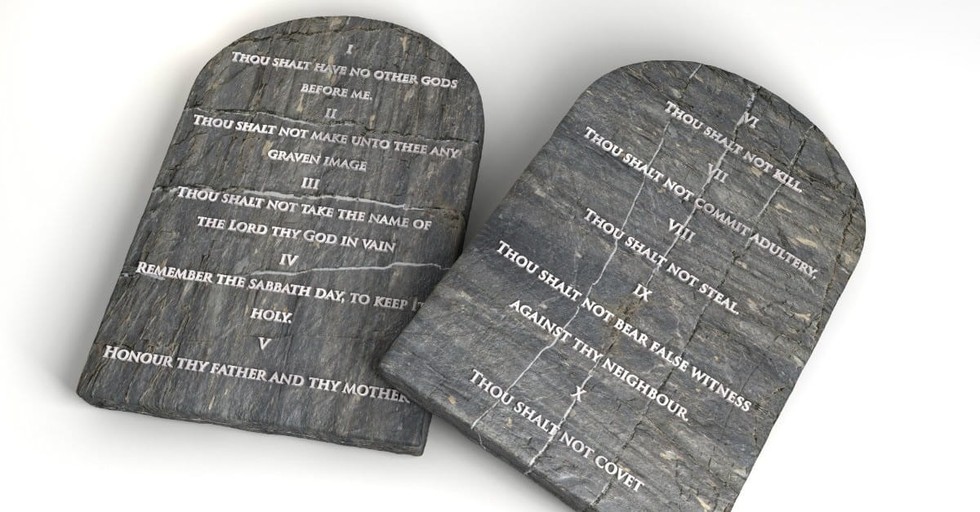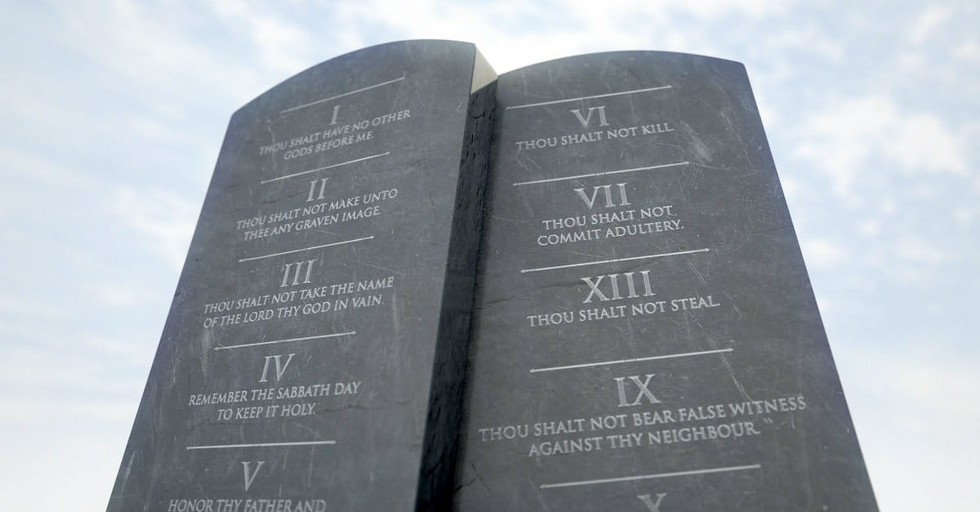10 Things You Didn’t Know about the 10 Commandments
- Jennifer Waddle iBelieve Contributor
- Updated Sep 06, 2024

I suppose for many, the only exposure to the 10 Commandments has come from movies and television shows. I was surprised to find that there have been at least seven motion pictures produced since 1923—the first being a silent film. Gone are the days of the classic Charlton Heston version. Now, there are documentaries, animations, online videos, and mini-series’ of the infamous story.
The biblical account of the 10 Commandments, however, paints a much deeper picture of the miraculous events surrounding Moses and the Israelites in the wilderness of Sinai. The books of Exodus, Leviticus, and Numbers record, in detail, the 11-month period that the Hebrew nation camped at the foot of the mountain and were tested by God.
According to Bible Study Tools, "These laws delivered to Moses presented the framework for a new Israelite nation, they provided the morality of personal and property rights observed in our modern legal system. Jewish tradition holds that all 613 laws found in the Torah are summarized in the 10 Commandments. Though Christians do not believe achieving the law is demanded for salvation, they still see the Ten Commandments as the establishment of God’s moral law. Jesus called people to an even higher standard by obeying the commandments not only in their behavior but also in their hearts and minds. For instance, Jesus quoted the command to not commit adultery (Exodus 20:14, Deuteronomy 5:18)."
If you’ve never done an in-depth study of these Old Testament books, I encourage you to take some time to study them closely. I was blessed to discover some interesting things I didn’t know before. Here are 10 things you might not know about the 10 Commandments.
Photo credit: ©GettyImages/allanswart
-
![Moses before the Red Sea]()
1. The 10 commandments were spoken to Moses three months after he led the Israelites out of Egypt.
Slide 1 of 5We can only imagine what the Israelites were going through, three months after they’d been led out of Egypt. Six hundred thousand men, besides women and children, had witnessed their miraculous deliverance from the hand of Pharaoh. Yet, within a few weeks, the people began complaining about water to drink, (Exodus 15:22-27), and bread to eat. (Exodus 16:2-5)
God’s timing in waiting until the third month to give the commandments was no coincidence. He had already proven Himself as their Deliverer and Provider and it was time to test their faith and reveal His divine standards for them.
“You have seen what I did to the Egyptians, and how I bore you on eagles’ wings and brought you to Myself. Now therefore, if you will indeed obey My voice and keep My covenant, then you shall be a special treasure to Me above all people; for all the earth is Mine.” (Exodus 19:4-5)
The third month also parallels the New Testament Pentecost, when the Holy Spirit came upon the first church in Acts 2. The Israelites were God’s chosen people, and by setting forth His commandments, He was declaring an everlasting covenant with them that would later be fulfilled in Jesus’ life, death, and resurrection.
2. The Commandments were written by God, not Moses
“And Moses turned and went down from the mountain, and the two tablets of the Testimony were in his hand. The tablets were written on both sides; on the one side and on the other they were written. Now the tablets were the work of God, and the writing was the writing of God engraved on the tablets.” (Exodus 32:15-16 NKJV)
It is often assumed that when God spoke the commandments in Exodus chapter 20, it was Moses who wrote them down. But the tablets were inscribed by the finger of God. (Exodus 31:18)
There have been skeptics who claim that Moses copied the commandments from an ancient Babylonian text called the Code of Hammurabi. While Hammurabi did record 282 civil and criminal laws, 300 years before Moses, any similarities between the two sets have remained just that—similarities. Hammurabi’s laws were based on civil actions and harsh punishments. The 10 Commandments were based on God’s deep and unconditional love for His people.
Photo Credit: ©GettyImages/heywoody
-
![two stone slabs, the Ten Commandments]()
3. There were actually two sets of stone tablets.
Slide 2 of 5Because Moses remained on Mt. Sinai for such a long period of time, the Israelites figured he wasn’t coming back down and decided to make an idol in the form of a golden calf. When Moses saw it, he threw the first tablets down the mountain in anger.
“So it was, as soon as he came near the camp, that he saw the calf and the dancing. So Moses’ anger became hot, and he cast the tablets out of his hands and broke them at the foot of the mountain. Then he took the calf which they had made, burned it in the fire, and ground it to powder; and he scattered it on the water and made the children of Israel drink it.” (Exodus 32:19-20 NKJV)
After that, the Lord called Moses to chisel a new set of stone tablets and once again trek up the mountain for divine revelation. This time, Moses fasted 40 days and 40 nights, listening to the voice of the Lord as He spoke the words of the covenant law a second time.
4. The 10 Commandments were placed in the Ark of the Covenant
I have a plaque of the 10 Commandments hanging on my wall that was made to look like ancient stone. My husband and I bought it on our tenth wedding anniversary, as a reminder of God’s faithfulness to our family. I plan to keep the memento and pass it down to my children and grandchildren as an heirloom of faith.
But the real stone commandments, according to Exodus 40:20, were placed by Moses into the Ark of the Covenant. Also known as the Ark of the Testimony, it was a chest made from acacia wood, overlaid with gold, and used to hold the rod of Aaron and a portion of Manna as well.
The Ark would eventually be housed in the Temple, but later become “lost” to the world. Dozens of speculations about it’s whereabouts remain in circulation, while the book of Revelation mentions the Ark of the Covenant in heaven, found in the temple of God. (Revelation 11:19)
Photo Credit: ©GettyImages/allanswart
-
![fifth commandment, parents with child]()
5. Commandment number five is followed by a direct blessing.
Slide 3 of 5“Honor your father and your mother, that your days may be long upon the land which the Lord your God is giving you.”
This is the fifth commandment found in Exodus 20, and it is also the one commandment that is followed by a blessing. It is worth noting that God’s gift of long life is much more than a lengthy number of days. It is a promise of His provision, protection, and guidance every day of our lives. Honoring our parents was included in the 10 Commandments because God ultimately wanted His people to honor Him. Treating our earthly parents with due respect is just a hint of how we honor and glorify God.
Even when relationships are fragmented and parents seem unworthy to receive honor, there is great blessing when we choose to obey the fifth commandment. God knows. He understands. And He is faithful in keeping His promises.
6. All but one commandment is upheld in the New Testament.
From the very first command to have “no other gods,” to the commandment against coveting, all but one of the commandments are backed up by Jesus and His disciples. (See Matthew 5:17-32, Mark 7: 9-13, Luke 18:20, 1 Corinthians 8:5-61, Corinthians 5:10-11, and Colossians 3:5).
Keeping the Sabbath is the only commandment that is mentioned differently in the New Testament. As Jesus said, “The Sabbath was made for man, not man for the Sabbath. So the Son of Man is Lord even of the Sabbath” (Mark 2:27).
Hebrews chapter 11, verses 9-11, gives us more insight into the new covenant we have through Jesus Christ. “There remains, then, a Sabbath-rest for the people of God; for anyone who enters God’s rest also rests from their works, just as God did from his. Let us, therefore, make every effort to enter that rest, so that no one will perish by following their example of disobedience.”
For Christians, our Sabbath-rest isn’t the observance of a particular day of the week, but instead, a covenant relationship with the Son of God unto salvation—not by works, but by faith in Christ.
Having said that, I do believe God’s example of working for six days and resting for one is not only honorable to Him, but beneficial to us—especially if we set aside a day to worship, pray, and fellowship.
Photo Credit: ©GettyImages/digitalskillet
-
![inky words, lord's name in vain]()
7. It's easy to break the third commandment without realizing it.
Slide 4 of 5Simply Google the term “OMG,” and half a dozen dictionaries pop up with a whole slew of definitions. However, the bottom line is, it is saying “Oh my God.” Most of us have been desensitized toward phrases like this because we see them every day on social media. But referring to God’s name in any way that does not show deep respect and honor, is taking His name in vain.
The Bible says, “For they speak against You wickedly; your enemies take Your name in vain.” (Psalm 139:20 NKJV)
If God’s enemies take His name in vain, we, as Christians, should be careful to set ourselves apart by refusing to refer to Him in any way other than reverence and praise.
8. We are to write the commandments on our hearts.
I remember way back in the 80s, when I first became a Christian. Our college group memorized Psalm 119:11. “I have hidden Your word in my heart that I might not sin against You.” Years later, I passed that verse down to my kids, reciting it in the car and taping it to the bathroom mirror.
The Israelites were commanded to discuss God’s laws in the morning, in the evening, and anytime in between. They were to teach the commandments to their children, write them on their doorposts, and even display them on their wrists and foreheads. But above all, they were to wear them on their hearts. (Deuteronomy 6:6)
“Oh, that they had such a heart in them that they would fear Me and always keep all My commandments, that it might be well with them and with their children forever!” (Deuteronomy 5:29 NKJV)
Photo Credit: ©GettyImages/maurusone
-
![Ten Commandments stones]()
9. The number 10 signifies "completeness" in the Bible.
Slide 5 of 5The use of the number 10 occurs more than 240 times throughout Scripture. From the 10 plagues of the Old Testament to the 10 virgins of the New Testament, its significance cannot be missed. Ten is considered a number of perfection in the Bible, as well as the numbers 3, 7, and 12. (You can read more here.)
Without trying to find any “hidden meaning” in the Bible, we can see that God’s intent in writing 10 commandments, on tablets of stone, was to give His people a law of completeness. Though dozens more ceremonial laws were given to them as well, the 10 commandments were foundational in the covenant between God and man.
10. The early patriarchs didn't have the 10 Commandments.
It had never crossed my mind, before writing this article, that the patriarchs before Moses didn’t actually have the 10 Commandments in their midst. However, we know that God spoke to each of them on multiple occasions, made covenants with them, and gave them specific commands to follow.
The Lord told Adam to be “fruitful and multiply” and to not eat from the tree of knowledge of good and evil. (Genesis 2:16-17) God made a covenant with Noah, after the flood, that He would never again destroy the whole earth with water.(Genesis 9:11) And Abram, before he became Abraham, was promised that his descendants would be as numerous as the stars. (Genesis 15:5-6)
So, even though the patriarchs before Moses didn’t have the actual 10 commandments written in stone, they each had a relationship with God and walked by faith according to His commands. And in their obedience of faith, they were considered righteous (Hebrews 11).
Do the 10 commandments still apply to us today? Comment and share your thoughts on Crosswalk Forums!
Photo Credit: ©GettyImages/allanswart



 Previous
Previous



